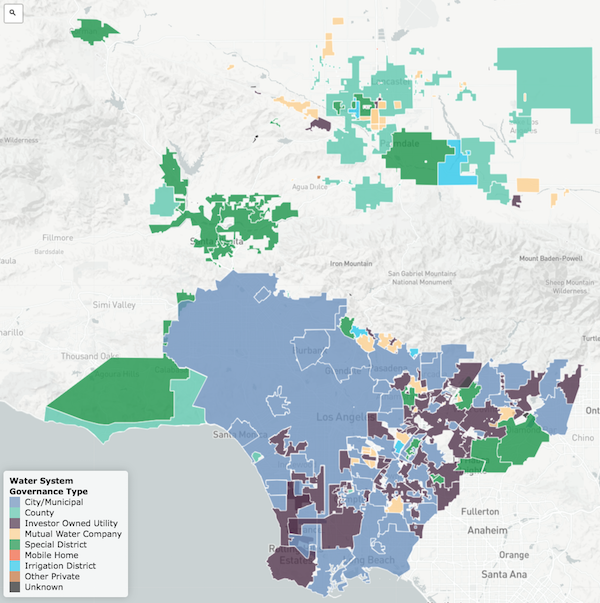New Lab Aims to Advance Access to Affordable, Safe Water UCLA’s Human Right to Water Solutions Lab expands research on drinking water across the nation
Since 2012, Californians have had a legal right to clean water — yet safe, affordable water is not always easily accessible throughout the state.
Issues like high water bills, contaminated water sources and outdated infrastructure complicate water access, especially in frontline communities — all against a backdrop of chronic drought in some of our most water-limited regions. Researchers are working to find solutions that make water access more just, including at a new research lab at UCLA.
To address the most pressing challenges in realizing safe, clean water throughout the country, the UCLA Luskin Center for Innovation has launched the Human Right to Water Solutions Lab. The lab is led by Gregory Pierce, co-director of the Luskin Center for Innovation, adjunct assistant professor in the Luskin School of Public Affairs and co-director of the UCLA Water Resources Group. In addition, the lab is advised by collaborators from across the nation.
Pierce and his research team have helped to guide California’s efforts to provide safe drinking water for all residents, as well as develop a plan for the first statewide low-income water rate assistance program in the nation. Now, the new lab is expanding its work across the country to support policy, advocacy and civic leadership solutions to improve water access, quality and affordability — the three key pillars of the human right to water.
“As lab director, I hope to cultivate a space to collectively improve access to clean water,” Pierce said. “This lab builds on the Luskin Center for Innovation’s broader goals to collaborate with community leaders and policymakers who can use our research to advance environmental equity.”
The lab has three objectives:
- Advance fundamental research on water access, quality and affordability solutions
- Support and amplify the efforts of community, scholarly and policy partners working to realize the human right to water
- Make data and training resources collected or generated through research more useful to the public
The new Los Angeles County Water Governance Mapping Tool illustrates the lab’s dedication to making data more accessible and useful for the public. Developed in collaboration with community-based organizations and the Water Foundation, this interactive visualization tool provides information about Los Angeles County’s complex network of water systems, each managed by a separate set of decision-makers and policies.
“We’re hoping to support Angelenos to understand where their water comes from and who is managing it,” said Peter Roquemore, a researcher in the lab and at the Luskin Center for Innovation. “There are more than 200 different community water systems in the county — it’s a complex system. This information can help hold water system leaders accountable to provide clean and affordable drinking water.”
The Human Right to Water Solutions Lab builds on the work of the Luskin Center for Innovation’s water program, which, under Pierce’s leadership, has grown over the past seven years from a single staff member to a team of more than 15 staff and students producing research to advance water access and equity.

Visit UCLA’s new Los Angeles County Water Governance Mapping Tool to search an address and access information including:
- Name of the water system that supplies water to the address
- Names of board members who direct the policies of that water system
- Demographics, tenure, and pay of individual board members
- Methods for selecting board members, including eligibility and election cycles
- Average cost and relative affordability of water from the system
- Safety and quality of water from the system
- Water operator qualifications



![IMG-2255[1] copy](https://luskin.ucla.edu/wp-content/uploads/2018/10/IMG-22551-copy-e1541126774412-200x200.jpg)






Leave a Reply
Want to join the discussion?Feel free to contribute!